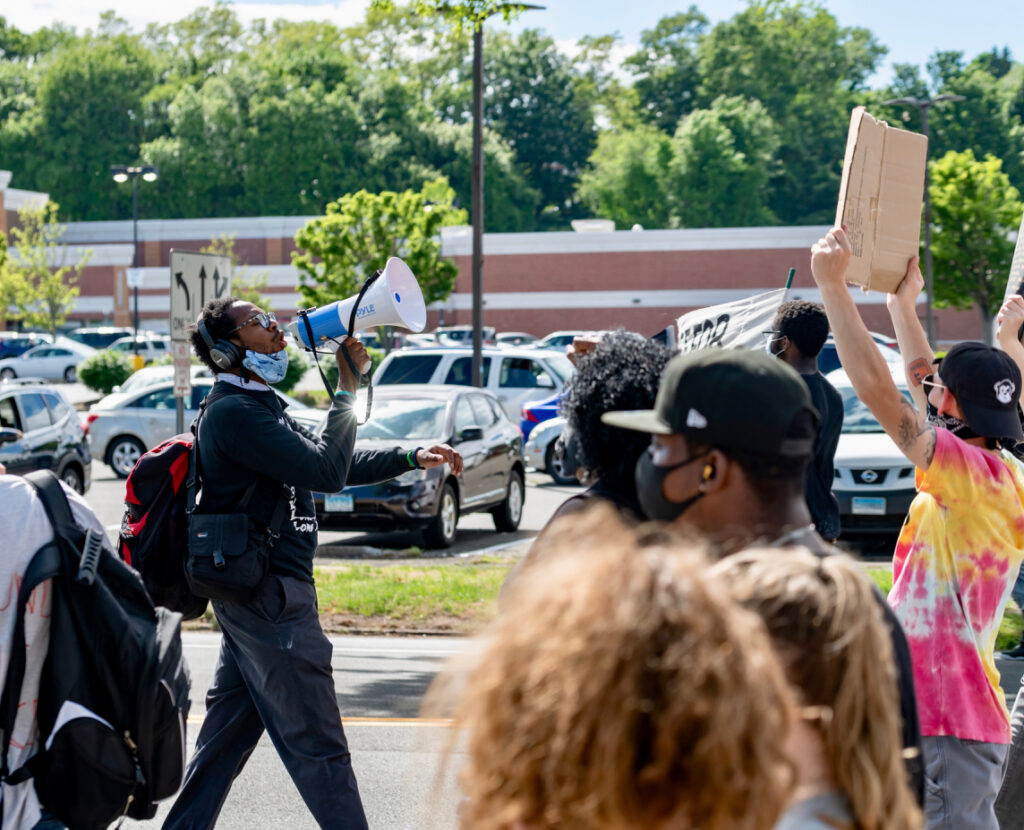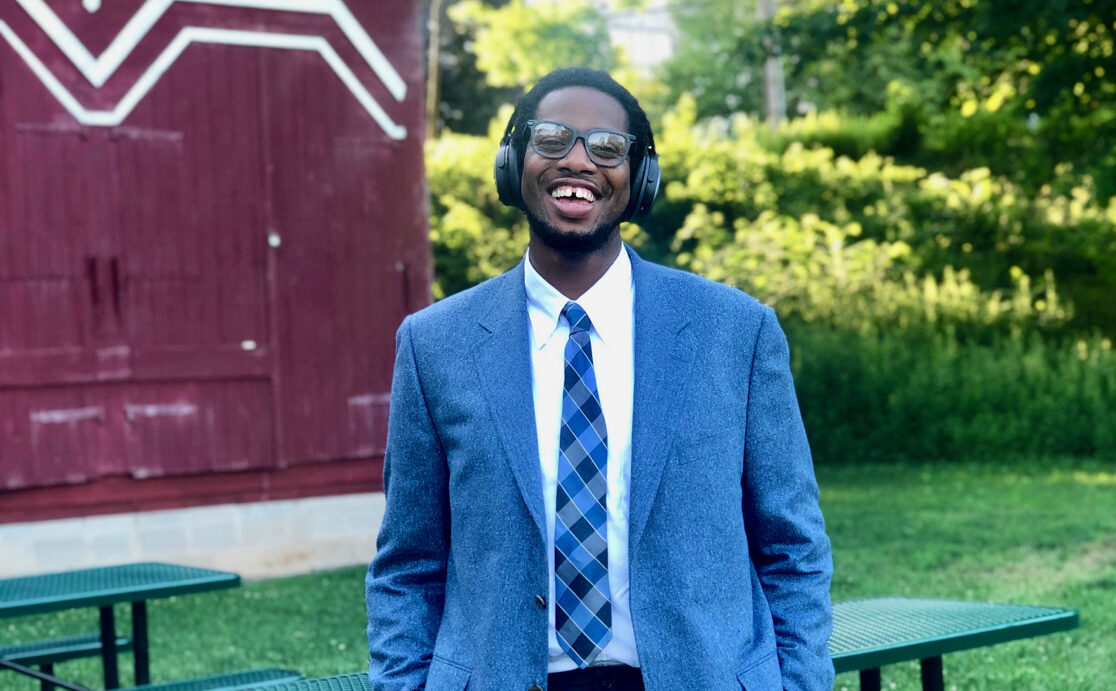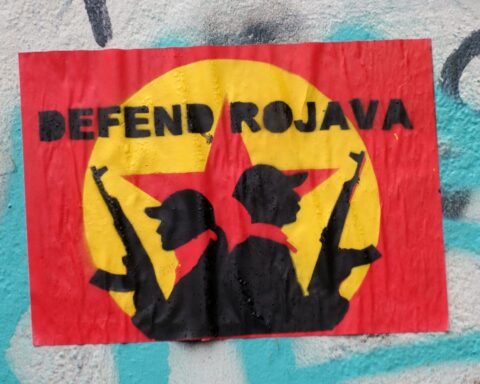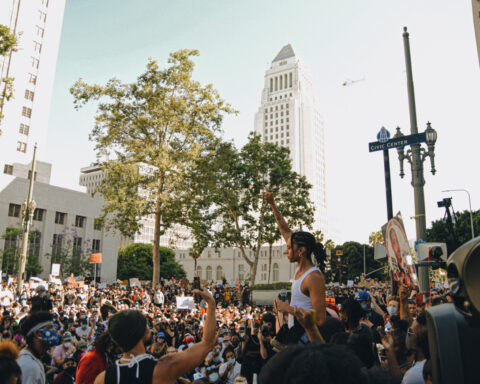Justin Farmer is a 25-year-old Legislative Councilman for the 5th district of Hamden, Connecticut. He is running for the state’s 17th Senate District and has been endorsed by the national DSA and Sunrise Connecticut. We talk about his motivations behind running for office and how his activism doesn’t stop there, tackling structural racism, disability justice in progressive spaces and building a stronger working-class presence in public policy.
You and your team have led the largest grassroots campaign in the history of Connecticut ahead of the August primaries. Seeing that you also won your race for Hamden City Council two years ago at the age of 23, it’s clear that you’re deeply involved in a range of issues in your community. Could you talk more about your background as a grassroots organizer and what got you into local politics in the first place?
I got radicalized at two different times. The first was when I was 17 and I started to develop signs of Tourette’s Syndrome. At the time, I didn’t know what was going on with me — I was struggling in school, I started to have difficulties with motor movement and anxiety in general. Tourette’s is a neurological movement disorder where you have physical movements and utterances. Most people know the rare 10% of us that have coprolalia which is cursing and saying inappropriate things. But at that time I had small movements here and there with my wrist and head and legs and didn’t really know what was going on. So I pushed my school to do some testing and a couple of months later, I started to have seizures on a regular basis and my school tried to kick me out to do homeschooling so they wouldn’t have to pay for resources. I ended up advocating for myself. I had been put on homebound school but I got a state lawyer to get me put back into school.
That experience of fighting for myself in my junior and senior years radicalized me. I started to get into the activist scene here in New Haven where I was involved with Unidad Latina en Accion (ULA) and in direct action. Then, I started to do a lot of climate work with undergrad students at Yale like Fossil Free Yale, DSA, Unite Here, New Haven Rising and with labor organizations.
After Trump won the elections in 2016, I started an issues campaign. I wanted to point out institutional racism in our community and to my surprise, after 3 months of knocking doors 7-8 hours a day, on election day, I won by 23 votes and since then every general election. So those are the two times I got radicalized and how I really got into activism — from having difficulty in school to now being an activist elected official and very much at the forefront of things instead of in the background.
You call yourself an “activist elected official” and have said before that you don’t believe in electoral politics despite that you are an elected official. Can you tell us more about what you mean by saying this?
I borrowed the terminology “activist elected official” from Jumaane Williams. He is a New York City public advocate. He’s Afro-Caribbean like myself, he has Tourette’s syndrome as well. His Tourette’s is more physical and it’s clearer to see him struggle and bend and twist and grimace on camera but to unapologetically tell his truth. He gets arrested at protests and demonstrations. He oftentimes will butt heads with the governor or the mayor. At the time he was a city councilor when I learned about him, I said, if I’m going to be in politics, I want to be like that guy. I want to be unapologetic about my truth and if I’m going to deal with my disability and be public, I want to do it with dignity as he does.
I’ve been arrested at environmental protests like the Yale-Harvard game, I’ve been very active about police violence, I’ve shown up, risking arrest for undocumented community members. When I tell people that I don’t believe in electoral politics, it’s because I realize how direct action works; you don’t have to be elected to make change. I believe electoral politics is harm reduction. I’m not so much of a person who believes in reform but I do believe that radical change starts on the ground with protests and demonstrations but it’s also policy and having people in positions of power to do harm reduction.
For instance, when I was running in a primary before I was elected [for Hamden Legislative Council], I was able to get an entire apartment complex to change 50 stairwells that were rotting out where people were falling through 10 feet at the max height. I was able to push the property owner with community support. That had nothing to do with electoral power and had everything to do with people power. I try to remind people that electoralism isn’t the end-all-be-all of how we make change.

Many people see you and your democratic opponent Jorge Cabrera both as progressives but there are stark differences between your positions on issues. What sets you two apart? In a broader sense, do you see yourself and him as representing the clear distinction between liberal and leftist politics (because people tend to conflate the two)?
Yeah, it’s exactly that. There’s a stark difference because it’s not hard to find my position on any given situation. I will gladly give it from a place of love and understanding but also be firm. You have liberals who will wax and wane and not give the honest answer or give a vaguest answer. Like we’ve all seen those memes of Pete Buttigieg where he says basically nothing and people are like “wow this is so inspiring!” You didn’t take a position on anything. You just said we are people and we’re doing stuff and we can get it together if we come together — you didn’t say anything. We need to deal with institutional racism if we’re going to move forward as a country, Brett Kavanaugh shouldn’t be on the supreme court — I could go on for days and days.
Whatever community members ask us about, we should be able to articulate it and if we don’t know, we should be honest and say we don’t know and educate ourselves. That’s the main difference between me and my opponent.
You are very open about your position on divesting from incarceration and policing as solutions to public safety. The idea of defunding or abolishing the police is still largely met with skepticism and I think one of the reasons why is because people misunderstand it. Can you describe what you really mean when you talk about divesting from these inherently racist institutions?
We will talk about how no one should be homeless, no one should work 2-3 jobs and not be able to keep on the lights. We can’t say that a jobs guarantee is a thing, we can’t say that housing should be a guarantee, that healthcare is a basic right. When people are talking about police abolition and divestment, they’re saying, “can we imagine ourselves as a society doing things differently?” It shouldn’t be radical to say if someone is having a mental breakdown, medical experts should deal with that person and not the police. It’s not radical to say that the cure to dealing with urban violence is a jobs program, affordable housing, healthcare and upward economic mobility. But when we say that the way we’re going to contain issues is by policing people, we’re not coming from a place of radical love.
To tackle these things, we need to look at other countries and other states. Like looking at Portugal, that had a serious drug problem, they did something different. They said: we’re going to legalize drugs and we’re going to put money into job training programs, we’re going to put money into mental health counseling, remediation and not retaliation. Their drug rates have dropped drastically, violent crime has gone down. They have amazing programs like needle exchanges and other places where people can recreationally use drugs responsibly without overdosing or contracting diseases.
It shouldn’t be radical to say if someone is having a mental breakdown, medical experts should deal with that person and not the police. It’s not radical to say that the cure to dealing with urban violence is a jobs program, affordable housing, healthcare and upward economic mobility. But when we say that the way we’re going to contain issues is by policing people, we’re not coming from a place of radical love.
When we talk about abolishing police and the fear of someone being assaulted, of violent, dangerous people — I’m concerned about that too. I don’t want that in my community either. But we have to think about it in a different way and about how we value each other; even people we deem as unredeemable have intrinsic value and we have to figure out how we can be in a community with people we disagree with or are fundamentally problematic. We have to figure out how we support and love one another. I feel if people view divestment and abolition from that perspective, then they will help create a just society where we can talk about these issues.
As you mentioned, you were diagnosed with Tourette’s Syndrome when you were 17. You also decided to run in part to bring to attention the needs of people with disabilities. In what ways do you think disability issues are undermined in progressive spaces and what are things that as leftists, we should be doing to incorporate disability justice in our own movement?
Ableism is rampant and built into our society in many ways. The Americans with Disabilities Act is relatively new. Ironically, it was strengthened by George Bush Jr. back in the early 2000s which gave a lot more rights and protections to people with disabilities. It’s something that most people don’t think about and us being cognizant of the intersection of disability and everything else can allow people to become more empowered to do the work of liberation. I think one thing we can do on the left is having people with physical, mental and emotional disabilities be part of conversations. I saw a blind classmate at a march and I had to run up to leaders and explain to them: hey there’s a person who is blind here and we need to be putting them in the front and we need to be supportive. I’ve been to rallies where I’ve seen people in a wheelchair literally on the highway. Have we discussed what will happen when this person’s battery runs out? Have we discussed how far we’re going and if we continue on this route, how we will get this person back?
For me, I wear noise-canceling headphones all the time. I have to figure out how I’m going to interact with people and educate them on my accommodations. If someone’s showing up differently, how can I make sure they feel just as welcome as I want to be? When we’re talking about transportation, about what a Green New Deal and a just economy looks like or low-carbon jobs, are we making sure that those opportunities will go to people with disabilities? So that they can empower themselves and help their communities as well? These are the thoughts I have when I do the work as someone with a disability.
Your campaign has connected well with activists in the younger generation. Take, for example, Sunrise, which is a youth-led climate movement. Both the New haven and Connecticut chapters have officially endorsed you. What’s one piece of advice you would give to the growing number of youth activists who have been invigorated by the recent political momentum and want to get involved but might not know exactly where to start?
I would say get involved wherever you can. For me, I was walking downtown and saw this march about making New Haven a sanctuary city. I just followed along and didn’t really know what it was about. We’re only talking about 6 years ago, I didn’t even know what a sanctuary city was. Now I’ve found my space and niche which is movement politics. Someone else’s might be in the environmental movement, it might be working in the ACLU to further litigation, it might be art and activism. It’s just getting involved in any way as you can. You might be an influencer on social media, you might be a photographer and taking pictures of the movement, you might be writing songs and poetry.
Sometimes it’s daunting to get involved if you don’t know the issues and you don’t want to say the wrong things or you don’t want to be embarrassed. My queer liberation agenda is based on what I’ve learned working with advocates and people affected. I’m proud to say that we have that part of our campaign but that took building connections with people, showing up to meetings, showing up to spaces, and willing to be uncomfortable.
One more question: You’ve said that it’s not about you being on the ballot or about you being elected but rather the right issues that are being represented and the people who are being represented. How do you think winning the race for state senate can help establish a deeper working-class presence in policy-making — one that will last in the coming decades?
I’m a first-generation Jamaican-American. I’m still finishing my undergrad education. I’ve been a part-time student and an elected official for two and a half years. I say that all to say that to be a Black, disabled man, a millennial and an incumbent elected official as a leftist is a huge thing. That completely changes the landscape in what type of conversations we’ll have and what conversations we need to have in the decades to come.
I’ll end with this: this is not a moment but truly a movement. It isn’t about me, it’s about electing community leaders who are going to serve their community. It’s about the youth who are volunteering their time in electoral politics but then also in direct action, putting their bodies on the line. So I see this as an ability to teach new people. I’m hoping two or three years from now, I won’t be the most radical person running but that the most radical person running got involved in our campaign and I can work to help them bring about systemic change.
If you enjoyed reading this, help support us by sharing it with others.




